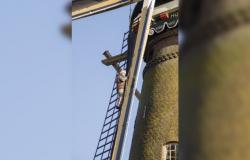NOS News•today, 09:37
Companies throughout the Netherlands do not adhere to rules to combat air pollution. Many substances that can be blown away by the wind, such as sand and ash, must be stored in a closed space according to the new Environmental Act. But hundreds of companies still store their substances in the open air, according to research by the radio and television program Argos.
The Environmental Act, which came into effect at the beginning of this year, contains stricter rules for the storage of ‘dust-sensitive substances’. These are substances that can blow into the environment during wind and dry weather, causing air pollution or nuisance and health damage for local residents.
The new rules were already announced in 2018, but companies opposed them Argos to be surprised. The Waste Companies Association has announced that the Environmental Act may have a much greater influence on the sector than expected. “We will consult with the Ministry of Infrastructure and Water Management about this.”
Since this year, companies that store metal scrap also have to do so in a closed space. The Metal Recycling Federation calls this “an impossible requirement” in a letter from the beginning of this month to the Ministry of Infrastructure and Water Management.
No capacity
The fact that companies do not comply with the rules may be because the environmental services do not enforce them, says independent expert Cor Coenrady. Argos. The environmental services say they do not know how many companies the new storage rule applies to. According to the umbrella organization Omgevingsdienst NL, the new list of ‘dust-sensitive substances’ is so extensive that “perhaps all companies we supervise fall under this regime”. According to the umbrella organization, there is “no capacity” to inspect all companies.
Despite resistance from companies, the Ministry of Infrastructure and Water Management is adhering to the new regulations. Previously, there were many exceptions, the ministry says. “Overarching policy has now been drawn up for diffuse dust emissions.”
Gray matter
Argos conducted specific research into the Heros company in Sluiskil, Zeeland. This company has 55 hectares of incinerated household waste, so-called bottom ash, stored in the open air. “That is a kind of gray desert of ash with all kinds of unburned pieces and metal in it,” says Argos editor Nikki van der Westen in the NOS Radio 1 News. “You can imagine that it is not nice when the wind blows over your village.”
Residents of Sluiskil suffer a lot from it, says Van der Westen. “There is dust on the windowsills, on car windows, and residents wonder: ‘What are we actually breathing in?'” Bottom ash contains lead, so “you should ingest it as little as possible, it is simply poisonous,” says Van der West. According to her, there are health effects of the bottom ash in the village. “Children have worse lungs and adults use more medication for cardiovascular disease.”
Heros responds to Argos that the new rules do not apply to the company. Heros also says it was not informed about the tightened legislation.
Two years ago, Nieuwsuur made a report about the industry in Sluiskil, and other problems associated with it:
In Sluiskil, the canal not only provides jobs







